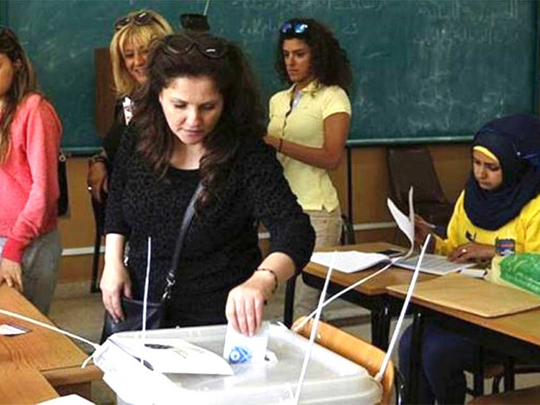
Damascus: An impressive 113 women are running for parliament in Lebanon next month, competing with 976 men for the 128-seat Chamber.
This is record-high, given that Lebanon has only had 10 women MPs since voting rights were granted to women back in 1953.
women registered to run for seats in the parliament
In the present chamber, elected back in 2009, only 12 women ran for office, out of 702 candidates.
Only four of them ended up winning — all hailing from hereditary political families.
They were voted in for their last name, rather than their political programme, and the list included Bahia Hariri, the sister of late Premier Rafik Hariri and aunt of current premier Sa’ad Hariri; Strida Geagea, the wife of Samir Geagea, commander of the Lebanese Forces (LF); Nayla Tweini, daughter of assassinated publisher Gibran Tweini; and Gilberte Zouein, the daughter of a former MP.
men have registered themselves to run in the election
Of the 113, a few names are expected to drop within the next few days, leaving the number, by all estimates, between 100 and 110.
Although many of those traditional faces are still in the race, other fresh newcomers have nominated themselves this year, promising change in the legislative branch.
“We need to push for change and seek to make it happen” said Dima Jamali, a professor at the American University of Beirut (AUB) who has nominated herself for an independent seat in Tripoli, northern Lebanon.
“We would be using only slogans if competent women do not actually join the race and try to get access to Parliament” she told Gulf News.
Jamali, young and dynamic, comes from a brilliant career in academia, where she is presently an Endowed Chair at AUB and National Representative for the Global Compact in Lebanon, working on Sustainability and the Sustainable Development Goals (SDGs). “I think I can bring this experience to Parliament” she said, “…and make a difference. Whether I get elected or not will show the extent to which Lebanon is really ready for change and to break from traditional stereotypes.”
All of Lebanon’s main political parties are publicising their women candidates, with the sole exception of Hezbollah, which came out with a statement saying that it had “reservations” about an expanded role for women in the legislative branch, saying that such duties “distract them from their homes.”
- Dima Jamali | Candidate
Hezbollah’s traditional ally, the all-Shiite Amal Movement of Parliament Speaker Nabih Berri, is also peddling its own candidate, being current Administrative Reform Minister Enaya Ezz Al Deen.
Other prominent candidates are famous media personalities like television host Paula Yacoubian, Raghida Dergham of the London-based Al Hayat daily, and Jessica Azar of Lebanon’s MTV.
“Definitely we are seeing some change when it comes to women representation” said Zeina Helou, the ex-secretary general of the Lebanese Association for Democratic Elections (LADE).
Speaking to Gulf News, she added: “The majority of those running are independents and not on party lists. But it is still not enough; 113 out of 976 is not enough. More and more women need to be aware of their role and to have a greater political voice in society.”
Lebanese women were given the right to vote and run for office back in 1953, during the presidency of Camille Chamoun.
They only got their first MP in 1963, however, when Myrna Bustani was chose to replace her father Emille Bustani, a famous businessman and philanthropist, who was killed in an airplane crash. They had to wait for another 28-years to get their second MP, being Nayla Mouawad, the widow of slain President Rene Mouawad. She was appointed to the Lebanese Parliament in 1991.
Nobody knows for sure how many of the women MPs will make it into the chamber next May.
“Not all of them would make good MPs” said Helou, stressing that being a woman doesn’t automatically qualify any candidate for being a good parliamentarian. Once inside the chamber, she expects them to tackle three main issues that are vital for women empowerment in Lebanon.
“One is the right of a Lebanese women to grant nationality to her children if married to a non-Lebanese. This is an important topic that has been mentioned by several of the candidates in their election programmes. Second would be combating discrimination against women that still exists in Lebanese legislation, especially in labor laws. Third would be gender quota in government.”












